 Petzlover
Petzlover Hairless Khala is originated from Mexico but Sarplaninac is originated from Macedonia. Hairless Khala may grow 21 cm / 8 inches shorter than Sarplaninac. Hairless Khala may weigh 31 kg / 68 pounds lesser than Sarplaninac. Both Hairless Khala and Sarplaninac has same life span. Both Hairless Khala and Sarplaninac has same litter size. Both Hairless Khala and Sarplaninac requires Moderate Maintenance.
Hairless Khala is originated from Mexico but Sarplaninac is originated from Macedonia. Hairless Khala may grow 21 cm / 8 inches shorter than Sarplaninac. Hairless Khala may weigh 31 kg / 68 pounds lesser than Sarplaninac. Both Hairless Khala and Sarplaninac has same life span. Both Hairless Khala and Sarplaninac has same litter size. Both Hairless Khala and Sarplaninac requires Moderate Maintenance.
 The Hairless Khala is from a number of Latin American countries, and these countries have a variety of these hairless hounds.
The Hairless Khala is from a number of Latin American countries, and these countries have a variety of these hairless hounds.
The dogs are known by different names. Khala is the Bolivian Quechua Indian name and it means 'no clothing' - an absence of fur. Both Central and South America have their hairless dogs, descendants of ancestral dogs owned by the Incan Empire.
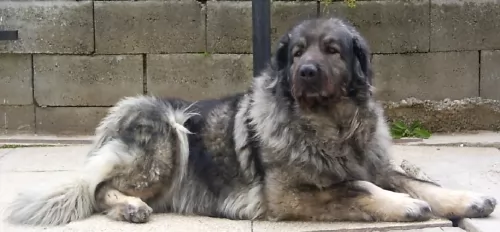 Hailing from Macedonia, the beautiful Sarplaninac dog was developed as a guardian of livestock and is large enough to fight off large predators like bears and wolves.
Hailing from Macedonia, the beautiful Sarplaninac dog was developed as a guardian of livestock and is large enough to fight off large predators like bears and wolves.
Nobody is too sure of the breeds exact origins, though it is thought that its ancestors came to the Balkan Peninsula with people migrating from ancient Asia.
This huge dog is one of the oldest native breeds from ancient Molosser breeds. The dog was recognized in 1939, and in 1954 it became known as the Yugoslav Shepherd Dog. Later the name changed and the dog was recognized by the United Kennel Club in 1995.
 There are 2 kinds of hairless Khalas – the Medio one which is a short legged dog which stands at roughly 36 – 41cm in height and weighs roughly 6 – 14kg. The other kind of khala is the Hairless Khala Grande, a long legged type.
There are 2 kinds of hairless Khalas – the Medio one which is a short legged dog which stands at roughly 36 – 41cm in height and weighs roughly 6 – 14kg. The other kind of khala is the Hairless Khala Grande, a long legged type.
Although the dog is hairless, you'll find some hair on the top of his head. For sake of space we'll refer to the Medio variety, a medium-sized hound with hairless skin which is dark grey in color.
The Hairless Khala is a friendly dog with his family but tends to be reserved with strangers. He gets on well with children in the home and because he isn't a particularly energetic dog, elderly people also find that he makes a super pet for them.
He is able to adapt easily to city- as well as country living. You need to be careful with him and not allow him out in the garden in the boiling sun as his skin can burn badly. Then again, without fur, he also tends to get cold easily.
He has dark brown eyes and the ears are fairly large in size and erect. He has a chest which is deep and broad and his tail is set fairly low and is held according to his mood.
He is an intelligent dog, and therefore easily trained. He is a loving, loyal dog who is capable of bonding closely with his human family.
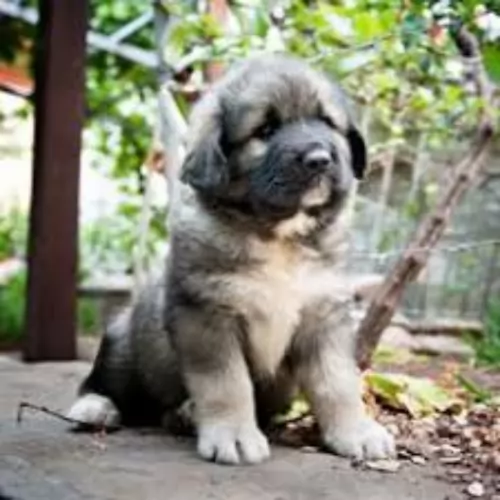 The Sarplaninac is a large, strong, fluffy dog standing at between 54 and 62cm in height and weighing between 30 and 45kg.
The Sarplaninac is a large, strong, fluffy dog standing at between 54 and 62cm in height and weighing between 30 and 45kg.
The coat of the dog is dense, coarse and of medium length. Colors are different shades of grey, white, tan and black. The head is large, the ears are fairly short but are floppy and covered with short hair. The dog is deep chested and the tail is long, often held high and covered with thick, feathery hair.
Protective, reliable, reserved, stubborn and gentle, this intelligent dog is fairly serious, and while he makes a devoted family pet, he is cool and wary of strangers.
Excellent training and socialization makes him well mannered, balanced and obedient around different people. He will tolerate children but won’t take easily to other pets in the house, capable of becoming aggressive with them.
 The Hairless Khala will make you an excellent pet, and children and the elderly are attracted to the dog because it is loving and docile. They are aloof with strangers, but training and socialization make him far more tolerant of strangers.
The Hairless Khala will make you an excellent pet, and children and the elderly are attracted to the dog because it is loving and docile. They are aloof with strangers, but training and socialization make him far more tolerant of strangers.
The Hairless Khala is an adaptable dog breed, and will adapt well to life in the city or in the country. Found throughout the Latin American nations, today he is essentially a companion dog, loving to be a devoted friend to his human family.
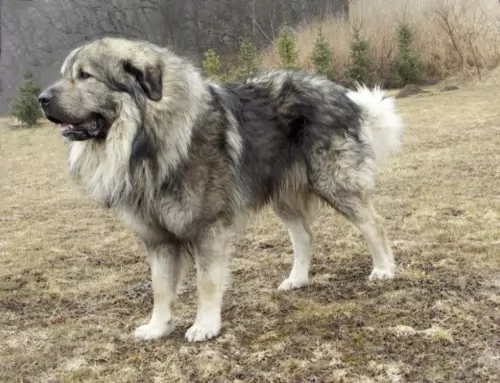 These dogs are protective, but they’re not vicious. When properly raised they are wonderful family pets.
These dogs are protective, but they’re not vicious. When properly raised they are wonderful family pets.
True, it’s a large, strong willed dog that isn’t a good choice for the first-time dog owner. They are good with children, but only children who have been taught how to treat animals with care and patience.
This dog is a powerful guardian type of dog, imposing in size, but it’s all about upbringing, and if you bring him up well then he can make a tremendous pet and companion.
 The life expectancy of this dog is 10-14 years when he is treated well. The Hairless Khala is a robust dog breed but even so, there are diseases to look out for -
The life expectancy of this dog is 10-14 years when he is treated well. The Hairless Khala is a robust dog breed but even so, there are diseases to look out for -
Skin allergies are one of the reasons you may have to take your Hairless Khala to the vet. These sorts of skin allergies can be frustrating for a dog because the skin is irritated and itchy and he may have scaly areas or red bumps on his skin. If your dog is licking and scratching frantically, you will need to get him to the vet.
Periodontal disease is inflammation of the gums, and if food and bacteria accumulate on the gums, it forms plaque and transforms into calculus, leading to gingivitis. Check your pet's teeth regularly and also brush them with special canine toothbrush and toothpaste at least 2 or 3x a week.
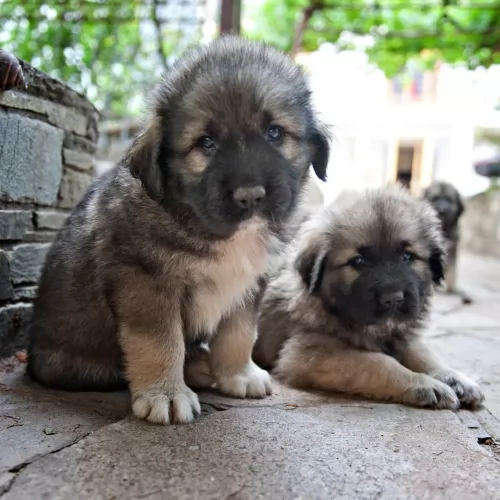 The Sarplaninac dog is a robust dog but he can suffer from health issues such as hip dysplasia, obesity, bloat, ear infections and skin allergies.
The Sarplaninac dog is a robust dog but he can suffer from health issues such as hip dysplasia, obesity, bloat, ear infections and skin allergies.
When your dog gazes up at you with such love in his eyes, don’t be tempted to pop some chocolate into his mouth or let him finish off your ice-cream. Treats like this can damage your pet’s health and give him heat intolerance, breathing difficulties, hypertension, liver disease and diabetes.
 He isn't a super energetic dog but still, he will need to be taken for a walk every day.You can also include typical games that all dogs love – fetching a ball or pulling on a rope.
He isn't a super energetic dog but still, he will need to be taken for a walk every day.You can also include typical games that all dogs love – fetching a ball or pulling on a rope.
Because of the dog having little or no hair, they are considered fairly hypoallergenic and also low maintenance. You'd need to brush a dog with fur, but a hairless dog requires different grooming.
Speak to your vet about bathing your dog, the type of body wash to use and how frequently it should be done. Because your dog is hairless, he may require a sun cream in the Summer and a jersey in the Winter.
He will also need his nails clipped and his teeth brushed as part of his grooming process.
He may not have much hair, but when it comes to diet he is much the same as any other dog. If you feed him commercially manufactured food, always choose the best quality one in accordance with his age, height and activity levels.
Home-made food is always a welcome treat for your pet, but whatever you feed him, make sure it has the necessary minerals and vitamins to ensure his health. Essential fatty acids will be needed to keep the skin moist. With too much washing, the skin of these dogs will become irritated, dry and flaking if he doesn't received a nutritious, balanced diet. Make sure he has constant access to fresh, cool water.
When in any doubt as to how to look after a hairless dog, speak to your vet.
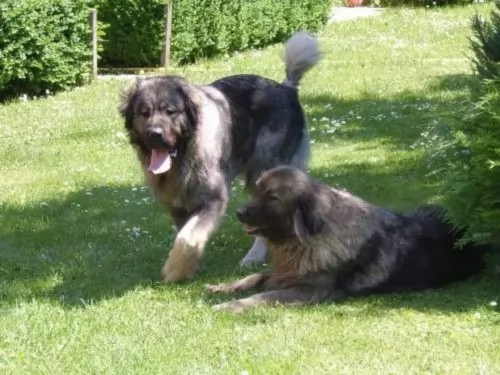 Every dog needs care from puppyhood through to old age.
Every dog needs care from puppyhood through to old age.
Šarplaninacs are looked upon as medium maintenance dogs. The coat is long and thick and requires a firm bristle brush to get their hair brushed.These dogs are moderate shedders so a brush twice a week will do the trick to keep the hair free of loose hair and matting.
Because these dogs have floppy ears, they will need to be checked and cleaned. Floppy eared dogs battle with moisture and wax build-up that increases the likelihood of ear infections.
Check the eyes that they are clear and free of discharge. Eyes with a lot of discharge can be indicative of health problems.
Check for any unusual lumps as cancer often starts with a new lump.
Provide your pet with a nice warm, dry place to sleep.
Keep his vaccines up to date to prevent deadly canine diseases.
Have him or her spayed or neutered if you don’t want puppies. These are regular procedures for a vet and offers health benefits for the dog. Neutering a male improves his character and keeps him from roaming. These dogs are capable of having 3 – 8 puppies.
The Sarplaninac requires decent food if he is to remain healthy. Dog’s stomachs can become upset if they eat all kinds of sweet and spicy human foods.
Commercially manufactured dog food is a good backup food to have because of its convenience. Try to include some home-made food. Simply add into one big pot chicken, brown rice or pasta and spinach, sweet potatoes and carrots. This food can all be chopped up and added in to the dry kibble twice a week. Give this to your pet twice a week and see how his tails wags when he smells it.
Also try to add in some raw meat to his food occasionally.
Ensure there is always a bowl of fresh, cool water within his reach.